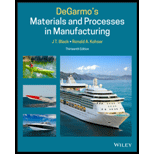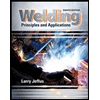
Degarmo's Materials And Processes In Manufacturing
13th Edition
ISBN: 9781119492825
Author: Black, J. Temple, Kohser, Ronald A., Author.
Publisher: Wiley,
expand_more
expand_more
format_list_bulleted
Concept explainers
Question
Chapter 7, Problem 31RQ
To determine
To define: - The surface finishing process that is used to produce metallic-colored aluminum products.
Expert Solution & Answer
Want to see the full answer?
Check out a sample textbook solution
Students have asked these similar questions
4-105. Replace the force system acting on the beam by an equivalent resultant force and couple
moment at point B.
A
30 in.
4 in.
12 in.
16 in.
B
30%
3 in.
10 in.
250 lb
260 lb
13
5
12
300 lb
Sketch and Describe a hatch coaming and show how the hatch coamings are framed in to ships strucure?
Sketch and describe hatch coamings. Describe structrual requirements to deck plating to compensate discontinuity for corners of a hatch. Show what is done to the deck plating when the decks are cut away and include the supporting members.
Chapter 7 Solutions
Degarmo's Materials And Processes In Manufacturing
Ch. 7 - What types of properties do nonferrous metals...Ch. 7 - For what respects are the nonferrous metals...Ch. 7 - In what ways might the nonferrous metals offer...Ch. 7 - Prob. 4RQCh. 7 - Prob. 5RQCh. 7 - Prob. 6RQCh. 7 - What properties of copper make it attractive for...Ch. 7 - Prob. 8RQCh. 7 - Prob. 9RQCh. 7 - Why does the copper designation system separate...
Ch. 7 - What are some of the attractive engineering...Ch. 7 - Why might cold�worked brass require a stress...Ch. 7 - Why might the term bronze be potentially...Ch. 7 - What are some attractive engineering properties of...Ch. 7 - Prob. 15RQCh. 7 - Prob. 16RQCh. 7 - Prob. 17RQCh. 7 - Prob. 18RQCh. 7 - Prob. 19RQCh. 7 - What is the primary benefit of aluminum recycling...Ch. 7 - Prob. 21RQCh. 7 - Prob. 22RQCh. 7 - Prob. 23RQCh. 7 - Prob. 24RQCh. 7 - How is the corrosion�resistance mechanism...Ch. 7 - Why do aluminum and aluminum alloys present...Ch. 7 - How are the wrought alloys distinguished from the...Ch. 7 - Prob. 28RQCh. 7 - Prob. 29RQCh. 7 - What unique combination of properties is offered...Ch. 7 - Prob. 31RQCh. 7 - Why are aluminum–silicon alloys popular for...Ch. 7 - What specific material properties might make an...Ch. 7 - Prob. 34RQCh. 7 - What are some possible applications of aluminum...Ch. 7 - Prob. 36RQCh. 7 - Describe the designation system applied to...Ch. 7 - Prob. 38RQCh. 7 - Prob. 39RQCh. 7 - How does the ability to strengthen magnesium...Ch. 7 - Prob. 41RQCh. 7 - Prob. 42RQCh. 7 - Prob. 43RQCh. 7 - Prob. 44RQCh. 7 - Prob. 45RQCh. 7 - What feature is used in the designation of...Ch. 7 - What are some of the primary application areas for...Ch. 7 - Prob. 48RQCh. 7 - Prob. 49RQCh. 7 - Prob. 50RQCh. 7 - What are the distinct characteristics of...Ch. 7 - Prob. 52RQCh. 7 - Prob. 53RQCh. 7 - Prob. 54RQCh. 7 - Prob. 55RQCh. 7 - Prob. 56RQCh. 7 - What temperature is generally considered to be the...Ch. 7 - Prob. 58RQCh. 7 - Prob. 59RQCh. 7 - Prob. 60RQCh. 7 - What are some applications of depleted uranium?...Ch. 7 - Prob. 62RQCh. 7 - Prob. 63RQCh. 7 - Prob. 64RQCh. 7 - What are some of the medical applications of...Ch. 7 - Prob. 66RQCh. 7 - Prob. 1PCh. 7 - Identify or select a product in which a magnesium...Ch. 7 - Prob. 3PCh. 7 - Prob. 4PCh. 7 - Prob. 5PCh. 7 - In 2008, The US Environmental Protection Agency...Ch. 7 - For each of the materials identified, determine...Ch. 7 - There are various pairings between the ball and...Ch. 7 - Which of the preceding combinations would you...Ch. 7 - Prob. 1.4CSCh. 7 - Prob. 1.5CSCh. 7 - Prob. 2.1CSCh. 7 - Prob. 2.2CS
Knowledge Booster
Learn more about
Need a deep-dive on the concept behind this application? Look no further. Learn more about this topic, mechanical-engineering and related others by exploring similar questions and additional content below.Similar questions
- An Inclining experiment done on a ship thats 6500 t, a mass of 30t was moved 6.0 m transvesly causing a 30 cm deflection in a 6m pendulum, calculate the transverse meta centre height.arrow_forwarda ship 150 m long and 20.5 m beam floats at a draught of8 m and displaces 19 500 tonne. The TPC is 26.5 and midshipsection area coefficient 0.94. Calculate the block, prismatic andwaterplane area coefficients.arrow_forwardA vessel loads 680 t fuel between forward and aft deep tanks. centre of gravity of forward tank is 24m forward of ships COG. centre to centre between tanks is 42 m. how much in each tank to keep trim the samearrow_forward
- Beam of a vessel is 11% its length. Cw =0.72. When floating in SW of relative denisity 1.03, TPC is 0.35t greater than in freshwater. Find the length of the shiparrow_forwardAn inclining experiment was carried out on a ship of 4000tonne displacement, when masses of 6 tonne were moved transverselythrough 13.5 m. The deflections of a 7.5 m pendulurnwere 81, 78, 85, 83, 79, 82, 84 and 80 mm respectively.Caiculate the metacentric height.arrow_forwardA ship of 10 000 tonne displacement has a waterplanearea of 1300 m2. The ship loads in water of 1.010 t/m3 andmoves into water of 1.026 t/m3. Find the change in meandraughtarrow_forward
- A ship of 7000 tonne displacement has a waterplane areaof 1500 m2. In passing from sea water into river water of1005 kg/m3 there is an increase in draught of 10 cm. Find the Idensity of the sea water.arrow_forwardA ship has 300 tonne of cargo in the hold, 24 m forward ofmidships. The displacement of the vessel is 6000 tonne and its centre of gravity is 1.2 m forward of midships.Find the new position of the centre of gravity if this cargo ismoved to an after hold, 40 m from midshipsarrow_forwardSketch and describe how ships are supported in dry dock. When and where does the greatest amount of stresses occur?arrow_forward
- Sketch and desribe a balanced rudder and how it is suspendedarrow_forwardA ship 140 m long and 18 m beam floats at a draught of9 m. The immersed cross-sectionai areas at equai intervais are 5,60, 116, 145, 152, 153, 153, 151, 142, 85 and 0 m2 respectively.Calculate:(a) displacement(b) block coefficient(c) midship section area coefficient(d) prismatic coefficient.arrow_forwardA steamer has waterplane area 1680m2 recorded in water with relative denisty 1.013. Displacement = 1200 t, calculate difference in draught in salwater reltive denisity 1.025.arrow_forward
arrow_back_ios
SEE MORE QUESTIONS
arrow_forward_ios
Recommended textbooks for you
 Welding: Principles and Applications (MindTap Cou...Mechanical EngineeringISBN:9781305494695Author:Larry JeffusPublisher:Cengage Learning
Welding: Principles and Applications (MindTap Cou...Mechanical EngineeringISBN:9781305494695Author:Larry JeffusPublisher:Cengage Learning

Welding: Principles and Applications (MindTap Cou...
Mechanical Engineering
ISBN:9781305494695
Author:Larry Jeffus
Publisher:Cengage Learning
composite-materials; Author: Tonya Coffey;https://www.youtube.com/watch?v=Vu6ik-bcKf4;License: Standard youtube license